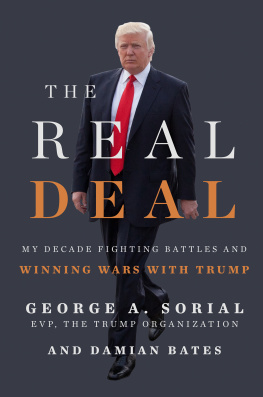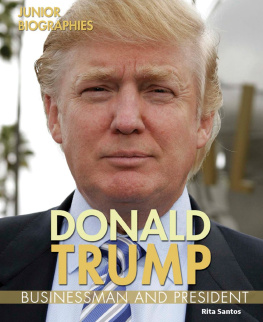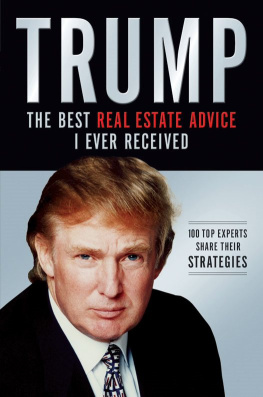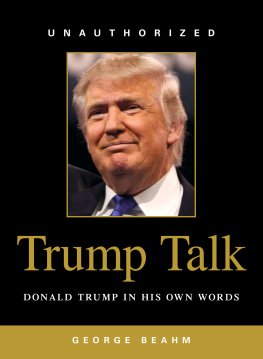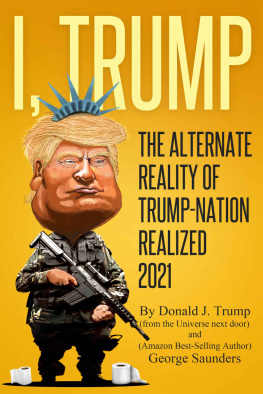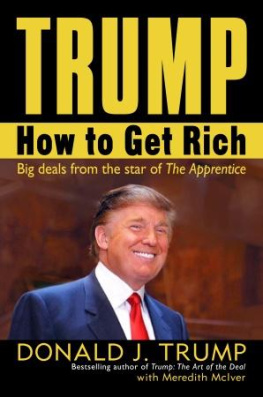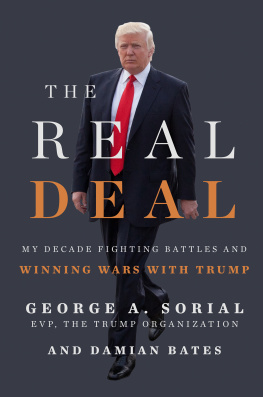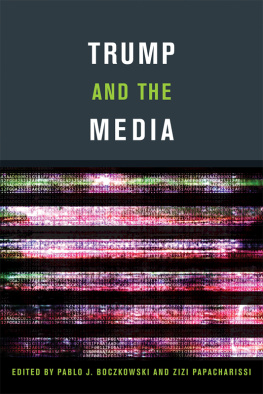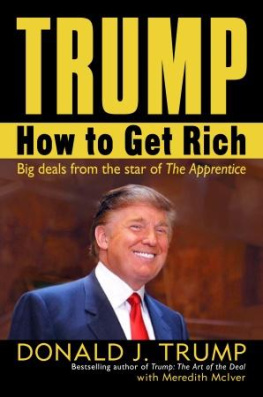Contents
To our families and friends with love
Have I not commanded you? Be strong and of good courage; do not be afraid, nor be dismayed, for the Lord your God is with you wherever you go.
Joshua 1:9
Chapter 1
The Golden Years
The gray clouds on the New York City horizon were mirrored by the metaphorical ones hovering over the economy as the price of a barrel of oil floated around the $50 mark. The talk was of an impending recession.
At Trump Tower, however, over on Fifth and Fifty-Seventh, the outlook on this overcast day in 2006 was very different. The future looked bright. Outside the massive atrium of this golden temple of commerce, many remembered a huge banner that previously flew proud, bearing the unforgettable slogan Youre Fired! Underneath, in more muted tones, it thanked the people of New York for helping to make the biggest new TV show of the year possible. It wasnt that long ago that a staggering twenty-eight million people watched Thursday nights The Apprentice as it reached its climax in its debut season.
Splashed across that brash, bright banner was one man walking intently toward the camera. He was the star of the show and the one figure on which all the fuss was focused. He was gaining reams of column inches in magazines and newspapers, more coverage than hed ever seen before. They all wanted to interview The Donald. The show was attracting younger viewers with college educations who earned good money. It was proving a TV triumph and bringing new attention to what would become one of the biggest and most controversial brandsnot to mention nameson the planet.
The Trump Organization was riding high, enjoying the plaudits, attention, and free publicity that came with the boss being plastered all over the nations screens week in, week out, as season followed successful season of the hit show. The accelerating success was a result of the incredible publicity that came with that groundbreaking TV show and its brash, fearsome, direct leader. Not everyone wanted to do business with Donald J. Trump, of course, but the organization was being swamped with offers, ideas, and requests from all over the globe. The Apprentice was arguably the best thing to ever happen to The Trump Organization, and it made the business the global brand it is today.
I remember those times, and that specific day so clearly, because I stepped into that maelstrom of ideas and talent, and it changed my life.
In the beginning, I felt more than a little out of place. I was a quiet guy who had been taught by monks at a private Roman Catholic school and had cut my teeth as a low-key lawyer in New Jersey. I had seen The Trump Organization up close already, and it was exciting, unlike any place Id ever worked. But seeing it wasnt the same as working there.
Donald Trump had been primarily a New York developer with some other projects in Atlantic City and Las Vegas. Now he was suddenly looking at opportunities in England, Ireland, France, Greece, Egypt, India, Indonesia, and elsewhere. We were all looking at the future of the business going international. The United States would always be our home, but we had many eyes on foreign jurisdictions.
This was the golden era of The Trump Organization.
As the business developed, so did the familys input. One by one, three of the Trump children emerged out of the shadows and found their voice and role in the officefirst Don Jr., then Ivanka, and finally Eric. Their impact and learning curve was swift, as they were given projects to launch and licensing deals to develop, and they began to help the Trump Org continue to ride the crest of the wave.
As with many other businessmen, Donald J. Trump had built his empire on long hours, ingenuity, and a significant amount of debt to help fund the increasingly ambitious developments that he wanted to create across the New York skyline. Now, flush with television money and international licensing deals, he was determined to establish a deeper foundation that was based on equity. He drilled his new mantra into everyone: Were not going to take any debt. Were going to do this with cash.
Previously he had been known as the king of debt and leverage deals. He was now entering a period when he was getting significant income from The Apprentice, product licensing, real estate licensing deals, books, speaking engagements, and property operations. I remember he once said to me, Why should I take the risk of putting up a ninety-story building when I can do one season of The Apprentice and make tens of millions?
In that period, the ninety-story Trump World Tower (TWT) at United Nations Plaza sold out, and he had great success with other buildings such as those in Las Vegas and Chicago. It was a perfect storm of cash, and it created the foundation to do a lot of the equity deals that occurred over the more than a decade I have worked with him since.
Thats not saying that he became 100 percent debt-free. Having a balanced level of debt is a healthy thing. However, he wasnt overextended anymore. He had both cash and debts, and therefore, he had a very firm foundation to stand on.
The licensing and real estate deals gained traction for Trump. He lent his name to hotels and other property deals and provided assistance during their construction, as well as marketing and management help. As a consequence, the Trump Org was given significant up-front fees and pieces of the profit as the money flowed in.
Trump had previously handled most of the effort: going out to find and purchase land, working through the approval process, and then putting up a buildingso these licensing deals were great. There was no money required up front, and it was all liquid at the outset without the risk.
It also came at a time when Trump was backing off some US-based investments because the real estate market was beginning to get very hot and expensive. Trump could smell danger brewing as investors threw too much money at overpriced plots of land with easy capital and bundles of debt products in the hope of making a quick buck; what they soon faced was one of the biggest financial crashes our nation, and the rest of the globe, had ever seen.
Trump wanted to diversify his portfolio and look at capitalizing on the licensing projects coming his way. He of course looked at doing deals in every jurisdiction outside the United States to spread his risk and take advantage of better opportunities elsewhere, the same way that other real estate developers looked at new and emerging markets. However, while The Trump Organization would always look at things, theres a big difference between looking at a deal and actually moving forward with ittheres a lot of steps in between, and deals in many geographic areas never came to pass.
Trump was now a global player, and everyone wanted to bask in that reflected glory and get into the name. However, he never strayed from the plan.
Heading into that building that day, I realized it was possibly the most prestigious address in Manhattan. The days ahead would never be dull; there was always a wide variety of people coming through those big doors and taking the gold elevator to the twenty-sixth floor. Visitors came from the political and sporting worlds, entertainers and regular Americans who had ideas to discuss with him and business to pitch. On any given day, you could meet Neil Young, Leonardo DiCaprio, Shaquille ONeal, P. Diddy, or politicians from across the world. All of them wanted to discuss their ideas, share their thoughts, or come in and say hello to Trumpand he welcomed them all.
Just five minutes in his office showed the real Donald J. Trump, and it was inevitably not what anyone had been led to expect. It was rarely awkwardhe can get along well with almost anyone. He can fit into many different situations in a way few other people can. Its one of the skills that make him unique. I participated in the hiring of numerous people over the years, and I always found it surprising to see how a prospective employee would react to him. The vast majority of those who passed through the doors left with the feeling,

